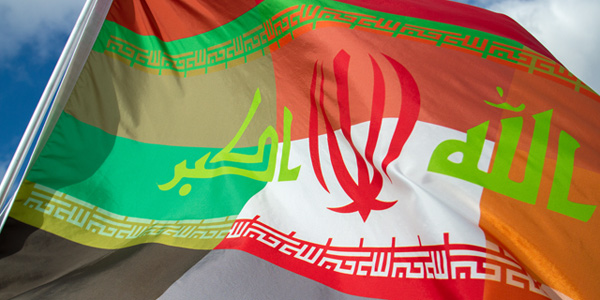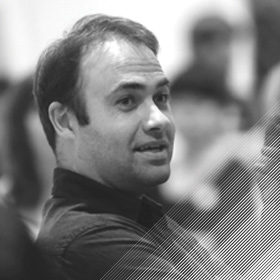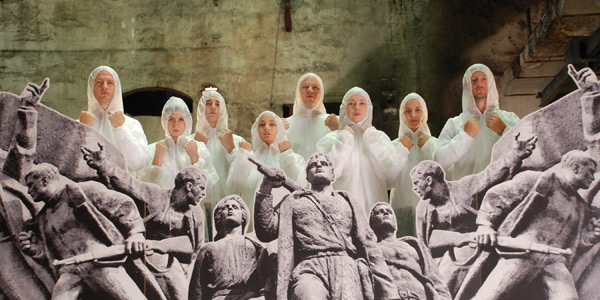![]()
HOW TO KNOW: PERFORMANCE AND INSTALLATION | STAGE DESIGN | THE PLENARIES
HOW TO KNOW: THE PROTOCOLS AND PEDAGOGY OF NATIONAL ABSTRACTION
PERFORMANCE AND INSTALLATION BY PEDRO LASCH
HOW TO KNOW, a new work by Pedro Lasch, frames the 2015 Creative Time Summit: The Curriculum, and is part of a larger series. Social interventions, visual compositions, flag displays, and musical works enable audiences to understand national anthems of other countries in their own language, while their own anthem becomes incomprehensible. For those speaking several languages, or having strong associations with more than one anthem, the experience is even more layered and representative of today’s cultural pluralism.
Each of the forty-eight flags of the installation at the Teatro alle Tese, in the Arsenale, combines four countries, so that all of the world’s countries are represented, in alphabetical order.
The flags are set in motion through simple choreographed movements by members of a color guard, here called the curricular guard for the multilingual terms and phrases that appear on their shirts; together the flags and color guard propose a re-envisioned curriculum for All of the World’s Futures. The opening musical intervention is a live voice- ensemble rendition of Composition 20: Indonesia, Iran, Iraq, Ireland, composed by Craig DeAlmeida and performed by Fran Newark, Erica Dunkle, Cameron Aiken, and Larry Speakman. Conducted by Rodney Wynkoop, this piece presents the anthems of all four countries simultaneously, each sung in the language of the country that follows it alphabetically. The closing intervention includes a new array of anthems, this time presented in a temporal sequence and accompanied by a video projection and participatory elements.


PEDRO LASCH
ARTIST
NEW YORK, USA
Pedro Lasch divides his time between North Carolina, where he has taught art, art theory, and visual studies at Duke University since 2002, and New York (NY), where he has led ongoing projects with immigrant communities and art collectives, such as 16 Beaver Group since 1999. His solo exhibitions and projects include Open Routines (Queens Museum of Art, 2006), Black Mirror (Nasher Museum of Art, 2008), and Abstract Nationalism & National Abstraction (The Phillips Collection, 2014); he has also participated in group exhibitions at MoMA PS1, MASS MoCA, Walker Art Center, CAC New Orleans (USA); Royal College of Art, Hayward Gallery, Baltic (UK); Centro Nacional de las Artes, MUAC (Mexico); the Gwangju Biennial (South Korea), the 12th Havana Biennial (Cuba), and Documenta 13, among many others. The author of two books, his art and writings have also appeared in numerous catalogues and edited collections, as well as journals across disciplines like October Magazine, Saber Ver, Art Forum, ARTnews, Cultural Studies, and Rethinking Marxism, and international news publications like The New York Times, The Philadelphia Weekly, El Universal, and La Jornada.
SPECIAL THANKS
Pedro Lasch would like to thank the following individuals for their support and participation in HOW TO KNOW: Srinivas Aravamudan, Lee Baker, Azeddine Chergui, Sheila Dillon, Laura Eastwood, Luciana Fellin, Esther Gabara, Emanuel Fiano, Tamika Galanis, Sinan Goknar, Alex Gordon, Brittain Hughes, Sally Kornbluth, Kelly Kosnik, Aaron Kutnick, Sophie Landres, Scott Lindroth, Jen Mazzarino, Charlotte McKay, Lynnette Miranda, Lynne O’Brien, Michaela O’Brien, Eylul Iscen Ozgun, Taylor Peterson, Richard Powell, Rosalia Romero, Kirsten Rutschman, Carmel Scharf, Dan Smith, Max Symuleski, Sally Szwed, Nato Thompson, Tara Trahey, Michael Anthony Williams, Nikita Yoshgewarun, and Linda Zhang.
STAGE DESIGN BY CHTO DELAT
Chto Delat derived their idea for the stage design of the 2015 Creative Time Summit: The Curriculum at the 56th International Art Exhibition of la Biennale di Venezia from the way the Soviet Houses of Culture (venues established to house all recreational activities) decorated community events such as trade union meetings, political rallies, or celebrations. Traditionally, their designs were intended to greet visitors and didactically encourage them to participate in the event’s agenda. Applying this method to the Summit, Nikolay Oleynikov and Dmitry Vilensky, from the Chto Delat collective, have created a series of banners that correspond with the Summit’s main themes. Each banner contains image and word games that approach the themes from various intellectual, political, and aesthetic perspectives.

ABOUT CHTO DELAT
Chto Delat (What is to be done?) is a collective comprising artists, critics, philosophers, and writers from St. Petersburg and Moscow. Responding to a sense of urgency about the need to merge political theory, art, and activism, it was founded in St. Petersburg in 2003. Chto Delat produces art projects, theatrical plays, videos, radio programs, educational seminars, public murals, and political campaigns. It also publishes a newspaper called Chto delat? Printed in Russian and English, this covers culture and politics from around the world. In 2013, the collective founded The School of Engaged Art, in St. Petersburg. Recent exhibitions include Time Capsule. Artistic Report on Catastrophes and Utopia, Secession Building, Vienna (2014); the São Paulo Biennale (2014); Really Useful Knowledge, Museo Nacional Centro de Arte Reina Sofía, Madrid (2014–15); and Art Turning Left: How Values Changed Making 1789–2013, Tate Liverpool (2013).
SPECIAL THANKS
This year’s stage design was brought to life with the generous support of the Trust for Mutual Understanding, supporting cultural and environmental exchanges between American nonprofit institutions and individuals in Russia and Central and Eastern Europe. More information at TMUNY.org.
THE PLENARIES
At the suggestion of Okwui Enwezor, Creative Time hosted a series of interdisciplinary plenaries in the months leading up to the Summit. Intended to ensure that the Summit would pose the most probing questions, spark insightful conversations, and address a wide range of pressing issues, each plenary approached the notion of “curriculum” from a different perspective. Transcriptions from the plenaries will be published in a comprehensive chronicle of All the World’s Futures to be released following the close of the exhibition.
The plenaries addressed the following:
INDIGENOUS KNOWLEDGE
Indigenous Knowledge looked to indigenous cultures for alternatives methods of structuring and disseminating knowledge. The interlocutors were Rudolph C. Ryser (Chair of the Board of Directors and Executive Director of the Center for World Indigenous Studies) and Liz MacKinlay (associate professor in the School of Education at the University of Queensland).
AESTHETIC KNOWLEDGE
Aesthetic Knowledge explored how art and artists provide alternatives to predominant ways in which knowledge is organized and disseminated. The interlocutors were Sarat Maharaj (writer; researcher; curator; Professor of Visual Arts and Knowledge Systems at the Malmö Art Academy at Lund University) and Luis Camnitzer (artist and professor emeritus at the State University of New York, College at Old Westbury).
THE NGO DEBATE
The NGO Debate considered both the weaknesses and the potential of task-oriented organizations that work outside of governmental structures. This plenary took the form of an interview with Victoria Bernal (Professor of Anthropology at the University of California, Irvine).
STANDARDIZING CURRICULA
Standardizing Curricula confronted the intention and effect of such educational trends as the Bologna Process and the Common Core State Standards. This plenary took the form of an interview with João Paraskeva (Chair of the Department of Education Leadership, and program director of the EdD PhD in Education Leadership and Policy Studies at the University of Massachusetts, Dartmouth).
RADICAL PEDAGOGY
Radical Pedagogy discussed educational models that engage with power through content as well as structure. The interlocutors were Carlos Alberto Torres (Director of the Paulo Freire Institute and Distinguished Professor of Education in the Graduate School of Education and Information Studies at University of California, Los Angeles and President of the World Council of Comparative Education Societies) and Shirley R. Steinberg (Research Professor of Critical Youth Studies at the University of Calgary).
THE EDUCATIONAL SPACE OF CIVIL SOCIETY
The Educational Space of Civil Society focused on how knowledge forms subjectivities and determines the nature of civil society. This plenary took the form of an interview with Teddy Cruz (architect, urbanist, and Professor of Public Culture and Urbanization in the Visual Arts Department at the University of California, San Diego).
OPEN SOURCE AND ONLINE EDUCATION
Open Source and Online Education mapped the ways in which new technologies condition contemporary encounters with knowledge and information. The interlocutors were Elizabeth Ellsworth (professor, School of Media Studies, The New School) and Marisa Ponti (assistant professor, Department of Applied IT, University of Gothenburg).
